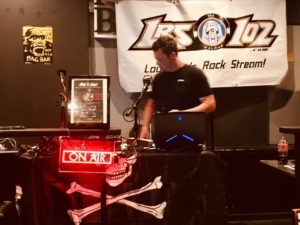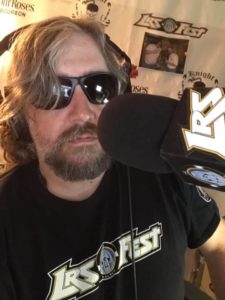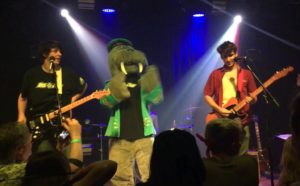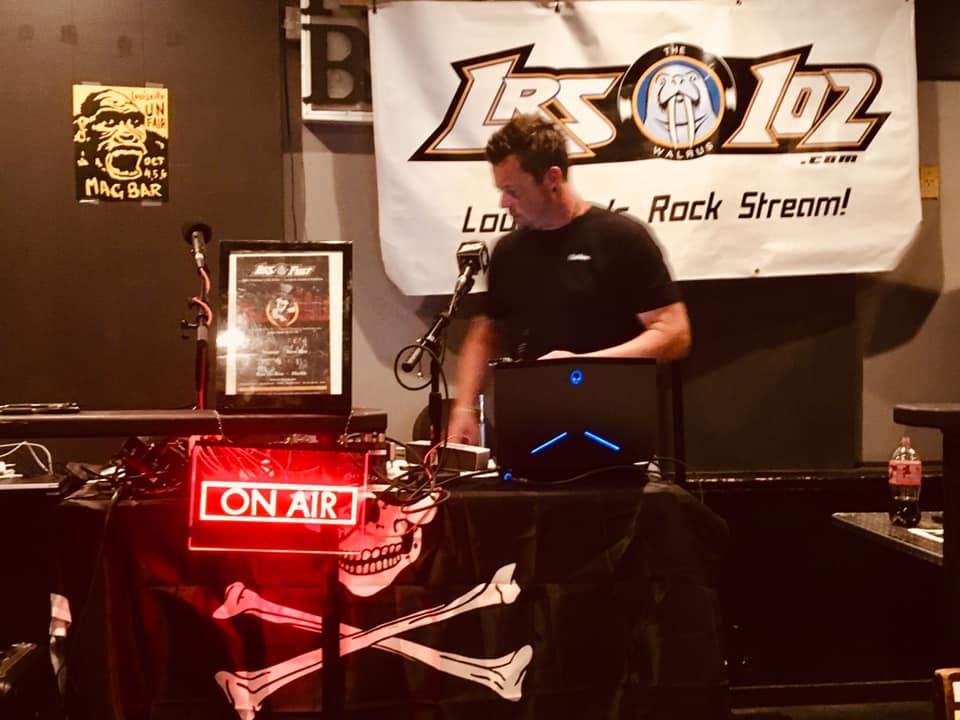Popular Station LRS 102 Revived Through Streaming
Writer / Carrie Vittitoe
Photography Provided
If you are of a certain age, you likely remember listening to the radio station for hours and hours at a time, just waiting for your favorite song to come on. As soon as you heard the first few notes of the beloved tune, you scrambled to hit the record button on your cassette player, which allowed you to listen to your favorite song whenever you wanted. There was no Spotify or iTunes or digital music; there was no such thing as music on demand. 
It is entirely possible that LRS 102 FM was the station you listened to nonstop in order to hear those favorite songs. Although LRS left the FM airways in 2008, it came back a few years ago as a streaming radio station, offerings fans of The Walrus the opportunity to hear a lot of what made the station so popular.
“LRS was the first stand-alone FM radio station in the Louisville market, launched in 1964,” Jim Coyle, owner and on-air personality, says. Under the guidance of Clarence Henson, the station was used as the city’s radio school to teach people how to engineer FM radio, hence the name Louisville Radio School. Henson turned it over to his daughter, Lisa, who transformed LRS into the rock station people remember it as. The station continued to be privately owned into the 1990s. It was at that point that the station began changing hands from one corporate outlet to another.
Changing ownership often meant that the radio music format would change. When it began playing soft rock, Coyle says there was an outcry among listeners, which resulted in it returning to its classic rock format. Some years later, Coyle says LRS was taken off and replaced by The Max 102. The resulting backlash from listeners after this change made executives bring back LRS on 105.1. It was at this point that Coyle came on board.
“I was part-time news and traffic for morning and afternoon drives for a while and then came on as fulltime promotions director and on-air personality. I was with them through 2008 when it went off the air,” Coyle says.
Coyle has always loved radio. He grew up in the Philadelphia/South Jersey area and loved sports. “I used to listen to Philadelphia Phillies games when a gentleman by the name of Harry Kalas was the announcer,” he says. Rather than going to bed, Coyle would tune into games that were being broadcast from the West coast. He admired Kalas’ voice and his detailed descriptions of the plays and field. “At an early age, I was walking around with a tape recorder and a microphone, interviewing people at the house and trying to create my own radio shows,” Coyle says.
After getting into radio as a profession, Coyle realized that one of the best things about the job is connecting with listeners within the community, which is what promotions work is all about. Not only are promotions giving out t-shirts and concert tickets or creating fun contests for listeners, but it is about raising awareness or funds for important causes. One of Coyle’s favorite LRS community events that not only engaged listeners but had a greater purpose in the city was the Kentucky Special Olympics Polar Bear Plunge.
“You’re gathering people together, you’re helping bring awareness to a cause that needs attention and the funds that you’re raising are being used right here in the state,” he says. “Things like that have been very rewarding for me.”
Another event in LRS history that was both promotional and charitable was the Bridge the Gap campaign that would take place during the holidays to raise funds for local families in need. The call letters ‘LRS 102’ lit up the Big Four Bridge before it became a pedestrian paradise.
When LRS went off the FM dial in 2008, it wasn’t because ratings were low. “We had a good company that came in and purchased the property and was really restoring a lot of the individual power to the station instead of being heavy from the top down,” Coyle says. Unfortunately, the company investors were heavy in real estate and banking, so when the subprime market blew up and the recession occurred, LRS was one of the casualties.
 Coyle remained in radio in various talk formats, but he was frequently recognized by the public as ‘Skinny J’ from LRS. People would frequently ask him if LRS was coming back. He felt certain that another station would acquire the rights to LRS because of its history and popularity, but when years went by without that happening, Coyle began looking into a rebirth of LRS by his own initiative. He quickly realized that a relaunch as an FM station was out of reach.
Coyle remained in radio in various talk formats, but he was frequently recognized by the public as ‘Skinny J’ from LRS. People would frequently ask him if LRS was coming back. He felt certain that another station would acquire the rights to LRS because of its history and popularity, but when years went by without that happening, Coyle began looking into a rebirth of LRS by his own initiative. He quickly realized that a relaunch as an FM station was out of reach.
“I decided that digital streaming was a better financial and technical option,” he says.
Launching an FM station in Louisville would have been an extraordinarily expensive venture because it would involve rights to the station name and bandwidth and the value of the station’s sales and advertising. It would also involve the physical equipment like a tower, condensers, I was even planning on going to air compressor dealers to search for other equipment we may need for our vehicles. However, for a few thousand dollars a year, as compared to millions, Coyle was able to make LRS a streaming station on Feb. 20., 2019.
LRS 102 is not a streaming service like Pandora or Spotify; listeners can’t create their own list of songs to stream. The new LRS has jockeys just like a traditional FM station that pull their own music and help break new bands onto the local scene.
“As long as you have a phone signal, you can get the station,” Coyle says. “There’s no static. You can listen all the way to Cincinnati, to Atlanta and even to Philly.”
In many ways, streaming has allowed LRS 102 to be a tighter, more efficient machine that can take advantage of press conferences and other pop-up events. “We are mobile. We can broadcast from just about anywhere with 10 minutes notice,” he says.
One of the best things about being a small, locally owned streaming station is that listeners get to hear a wider range of music than just what a corporate team thinks will be popular. Rather than playing the same songs over and over, jockeys at LRS can play B sides and deep cuts. “Our goal is to play a variety of rock music from the beginning of the station until now,” Coyle says.
More and more artists are releasing music directly from their websites and are very interested in partnering with small stations like LRS to get their music out to the public.
The team at LRS is chock full of radio veterans, including Chris McGill, Hippyhead, Leesa Mitchell and Nubbins. In addition to experience, they bring their own unique personalities and musical interests to listeners.
Being a small outfit also means that promotional partners don’t have to go through a lot of rigamarole to get an ad or promotion set up. There is no corporate office in another state that must be consulted. “I’m the owner, the morning show guy, the promotions guy. I can make those decisions one-on-one with a client,” Coyle says. “It makes us more accessible and easier to deal with.”
In addition to simply waking up every day and playing great music, Coyle loves the response from the public to the resurrection of LRS. “The reaction from people is absolutely amazing. It’s so exciting and gratifying. It reaffirms every day that what I’m doing is the right thing,” he says. 
Listeners can find the jockeys not only broadcasting downtown at 816 East Broadway, but also hear them via their smartphones by downloading the LRS app. The station also has a Facebook page and website: LRS102.com.





